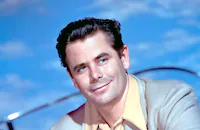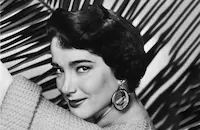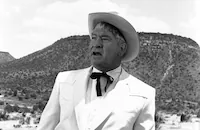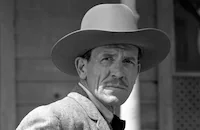The Man from the Alamo
Brief Synopsis
Cast & Crew
Budd Boetticher
Glenn Ford
Julia Adams
Chill Wills
Hugh O'brian
Victor Jory
Film Details
Technical Specs

Synopsis
In 1836, following the election of General Santa Anna to the Mexican presidency, the people of the free state of Texas find themselves faced with the unhappy prospect of a military rule by the new Mexican government. Leading the opposition to the new regime is General Sam Houston, who believes that a military force should be assembled to protect Texas' status as an independent republic. When word reaches Houston that Santa Anna has occupied San Antonio, and that Lt. Col. Travis, with only two hundred soldiers, has retreated across the Sabine River to the Alamo, he quickly assembles a militia. As the battle to save the Alamo rages on, a group of soldiers from Ox Bow, fearing for the safety of their families, draw lots and select John Stroud as the man to go back to the town to protect the women and children. Stroud reaches Ox Bow in the aftermath of a bloody massacre, and finds that his wife and son are among the dead. When the sole survivor of the massacre, a young Mexican boy named Carlos, tells Stroud that the killings were carried out by white men disguised as Mexicans, Stroud vows to hunt down the killers. Meanwhile, the Alamo has fallen into the hands of the Mexicans, who are now poised to charge across Texas. Under the leadership of Lt. Tom Lamar, the women, elderly and children of Franklin, Texas are evacuated. Stroud arrives in Franklin during the evacuation, and leaves Carlos in the care of one of the evacuees, Beth Anders. When Lamar recognizes Stroud as the man who left the Alamo before its fall, the entire town surrounds and taunts him. Just as Stroud is about to leave Franklin, Carlos tells him that a drunken man leaving the saloon is one of the men who massacred the people at Ox Bow. Stroud tries to approach the man, but the townspeople warn him to leave and attempt to lynch him. Jailed for his own protection, Stroud shares a cell with Dawes, a member of a renegade gang supporting the Mexicans. Hoping to infiltrate the gang, Stroud expresses his interest in its cause, and when gang leader Jess Wade breaks Dawes out of jail, Stroud goes with him. Wade later decides to go after the wagon train for its bankroll, and accepts Stroud as one of the gang. While waiting in a gorge, ready to ambush the wagon train as it passes, Stroud fires his gun at one of the gang members, Cobby, in a deliberate attempt to warn the approaching wagon train of the impending raid. Stroud's plan works, and the shots send the wagons scurrying for safety. Wounded in a gun battle with Wade and left behind to die, Stroud is found by Carlos and is brought back to the wagon train. There, Beth, the only person who believes that he was not a part of the renegade gang, nurses him back to health. Stroud makes a full recovery, and when Lamar receives orders from Houston to report his regiment to San Jacinto for the final assault on the Mexican army, Stroud is appointed the new leader of the wagon train. Stroud steers the wagon train southward and, after outrunning Wade's gang, sets a trap for them. As Wade's gang approaches, the old men and women of the wagon train, fully armed, defeat them in a fierce gun battle. After killing Wade in a hand-to-hand fight and avenging the murder of his family, Stroud leaves the wagon train to join Houston at San Jacinto.

Director

Budd Boetticher
Cast

Glenn Ford

Julia Adams

Chill Wills
Hugh O'brian

Victor Jory

Neville Brand
John Day
Myra Marsh
Jeanne Cooper
Mark Cavell

Edward Norris
Guy Williams
George Eldredge
Dan Poore
Erik Nielsen
Patricia Weil
Fred Coby
Robert Hoy
Emile Avery
John Phillips
Carl Andre
Evan Loew
Helen Gibson
Polly Burson

Dennis Weaver
Stuart Whitman
Charles Hand
Alberto Morin
Trevor Bardette

Walter Reed
Howard Negley
Stuart Randall
Arthur Space
Smokey Whitfield
Guy Wilkerson
John Mckee
Chuck Hamilton
Bob Smiley
Frank Wilcox

Robert Carson
Raymond Bond
Hugh Prosser
Dick Cutting
Monte Montague
Phil Chambers

Ken Macdonald
Edwin Parker
Harte Wayne
Ethan Laidlaw
Roy Butler
Felice Richmond
Frank Ellis
Walter Lawrence
Jed, A Mule
Crew
Betty Abbott
D. D. Beauchamp
Phil Bowles
Niven Busch
Leslie I. Carey
Harold Clifford
Al Cline
Oliver Crawford
Don Cunliffe
Steve Fisher
William Fritsche
Russell A. Gausman
Joseph Gershenson
Alexander Golitzen
Frank Gorback
Marshall Green
Ledger Haddow
Corson Jowett
Phil Lathrop
Ruby R. Levitt
Russell Metty
Harry Moran
Emrich Nicholson
Aaron Rosenberg
Tom Shaw
Frank Skinner
Joan St. Oegger
Dewey Starkey
Bill Thomas
Virgil Vogel
Bud Westmore

Film Details
Technical Specs

Articles
Man From the Alamo - Glenn Ford in MAN FROM THE ALAMO on DVD
Before Boetticher directed his famous series of westerns starring Randolph Scott, most of them for Columbia Pictures, he was under contract to Universal, where he churned out nine not-bad movies over two years. None became a true classic, but most have appealing casts and are engaging enough; The Man From the Alamo is one of the two or three best of the bunch. (The Audie Murphy-starring Cimarron Kid is a minor film.)
After a brief prologue, the story opens at the Alamo, where a messenger (Hugh O'Brian) arrives with the bad news that no reinforcements are to come. A few of the men privately draw lots to determine who will leave the Alamo to return home and look after all of these men's families. John Stroud (Glenn Ford) wins, if that is right word. "Johnny always was unlucky," says one of his friends. Sure enough, Stroud makes it out, finds his family and all the other families dead, and is promptly branded a coward by townspeople for running away from the Alamo where everyone else died. Only a Mexican boy who worked on Stroud's land with his father believes him. Stroud, meanwhile, has discovered the gang of bad guys who killed the families and sets about infiltrating their organization. Pretty Julie Adams plays a townswoman, and we know it's only a matter of time before she comes to believe the truth of the situation. In a series of fast-moving plot turns, Stroud eventually finds himself leading a wagon train of women (and a few old men) a la Westward the Women, as the bad guys close in fast.
Boetticher's directing of Ford outwitting and out-strategizing the villains is most impressive and no-nonsense. Ford always was superb at playing seething, revenge-seeking characters, and this one's no different. Adding to the fun are some mightily impressive stunts and horseplay - especially so because they are shown in uninterrupted takes, proving that they were really achieved and not just edited together to give the illusion of the stunt, as in so many movies today.
In his memoir When in Disgrace, Boetticher for the most part shrugged off this period of his career: "The producers at Universal, with one shining exception - Aaron Rosenberg - beat their brains out trying to teach me that motion pictures were not an art form, but a business venture. Still, I never believed them. For 104 weeks of the first two years [of my contract], with only Sundays off, I directed nine major Universal films. Katy Jurado complained that I was 'making pictures like tortillas,' and she was correct. I worked with a lot of young actors who, eventually, became stars, but the only good thing I seem to remember was the opportunity to become friends with Robert Ryan, Julie Adams, Sidney Poitier, Glenn Ford and Van Heflin. They were pros, who believed as I did that every picture demanded 100% effort."
The Man From the Alamo, which incidentally was produced by the afore-mentioned Aaron Rosenberg, was one of the Universal pictures that Boetticher felt stood a bit above the rest. He was right. It holds up today as an absorbing, well-acted, satisfying western, clocking in at an equally satisfying 80 minutes.
In addition to the two Boetticher films, this box set also comes with The Texans (1938), starring Randolph Scott, and California (1946), with Ray Milland and Barbara Stanwyck. Aside from some trailers, no extras.
For more information about Man From the Alamo, visit Universal Home Entertainment. To order Man From the Alamo, go to TCM Shopping.
by Jeremy Arnold

Man From the Alamo - Glenn Ford in MAN FROM THE ALAMO on DVD
Quotes
Trivia
Notes
According to an October 1951 Variety news item, John Ford and John Wayne protested Universal's use of the word "Alamo" in the title, noting that they had already registered the title The Alamo. After the matter went to arbitration, however, Wayne and Ford conceded that they had no exclusive right to the word "Alamo." The same item announced that Jeff Chandler was being considered for the starring role in the film.
According to a September 1952 Hollywood Reporter news item, Glenn Ford suffered three broken ribs during production when he was thrown against a tree by a horse. Filming was suspended for approximately five weeks. Studio publicity materials note that Francis the Talking Mule, for whom Chill Wills provided the voice in the "Francis" film series, was to have a cameo in The Man from the Alamo, but was replaced by the mule's stand-in, Jed. Some scenes were shot on location at the Agoura Ranch in Agoura, CA.

Miscellaneous Notes
Released in United States Summer July 1953
Released in United States Summer July 1953













